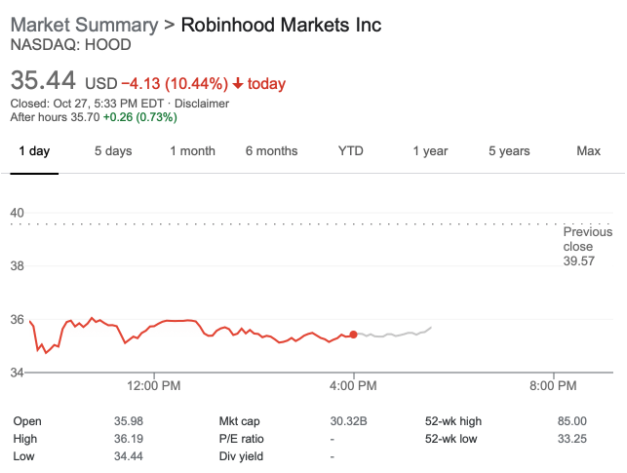Following a revenue miss in only its second earnings report as a public company, Robinhood stock is now trading below its initial IPO price, and investors are wondering if it’s run out of juice now that retail traders aren’t devouring “meme” stocks and crypto failed to fully fill the gap.
Robinhood’s Q3 revenue came in at $365 million, compared to $270 million a year ago, but it reported a net loss of $1.32 billion, or $2.06 per share, far worse than Wall Street’s expectations of a loss of $1.37 per share.
That combination of factors has led shares down 10% as of market close on Wednesday, October 27th, when the stock dropped below its IPO price of $38 per share.

So, even as revenues increased 35% year-on-year, Q3 revenues were down quite a bit from Q2’s showing at $565 million, which had been the result of a massive surge in crypto trading that failed to continue at the same fast growth clip. Only $51 million came from cryptocurrency trading, while revenue from crypto trading in Q2 totalled $233 million.
The problem is that Robinhood benefits inconsistently from flashing trends. That Q2 crypto trading money was mostly the result of a sudden meme-style burst of interest in dogecoin, which didn’t last. It was a meme fluke, not a lasting trend, and investors want to see more consistency here.
All broker dealers and crypto trading platforms tend to lose a bit of ground in the summer months, but Robinhood seems to have suffered more severely.
Robinhood’s app downloads (from which we can assume new account openings) dropped by 78% in the third quarter, quarter-on-quarter. Only 660,000 new customer accounts were opened in Q3, compared to 5 million new accounts in Q2. That’s a reversal that scares away investors.
And even though the market for crypto wallets is growing, the competition is heating up in tandem. It’s becoming a fairly crowded space, and Robinhood could get left behind.
Mastercard just announced that it partnered with the crypto firm Bakkt and is planning on integrating Bitcoin and other cryptocurrencies into its payments and banking platforms.
Mastercard’s move will be a major crypto boost considering that the credit card giant cooperates with more than 20,000 financial institutions. Some 2,300 U.S. businesses currently accept bitcoin in the U.S., and globally, some 15,000 businesses accept it as a form of payment.
The move could inspire more mainstream adoption of the asset, and other payment platforms are also jumping into the fray.
In April, PayPal’s Venmo announced that it would allow its 70 million active users to buy and sell cryptocurrencies on its platform. Users will also be able to convert their cash-back rewards into bitcoin and other cryptocurrencies for free.
A year ago this month, PayPal secured the first conditional cryptocurrency license from the New York State Department of Financial Services, the first approved entity for a conditional Bitlicense which enables users to trade cryptocurrency.
That same month, payment company Square said it bought 4,709 bitcoins, worth approximately $50 million, which represents about 1% of Square’s total assets. And earlier this week, Square’s CEO Jack Dorsey said that the firm is looking to build a bitcoin mining system.
So if Robinhood plans on retaining its investor base, it will have to deal with the crypto wallet competition and make sure it’s growth strategy isn’t dependent on the meteoric rise and fall of meme trends.
















